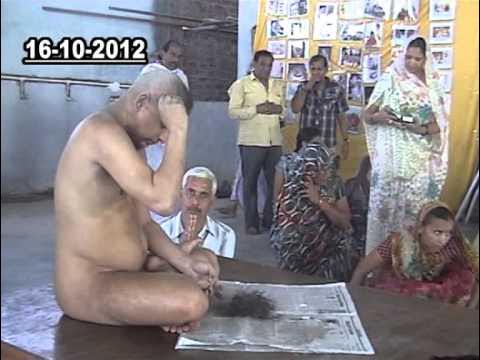Today in “things you probably neither needed nor wanted to know about the Pali canon”, we address a riveting question on the pressing issue of bottoms, and their relative spankededness (spankitude?) or lack thereof in communities of naked spiritual seekers in ancient India.
In SN 41.9, Citta the householder asks his old friend Kassapa (not that Kassapa) whether he had attained any of the good stuff, spiritually speaking, from his thirty years in robes. Or out of robes, to be precise, since he was a naked ascetic.
With refreshing honesty, he said “no”, and that the only things he’d attained are “nakedness, baldness, and pāvaḷanipphoṭanā”.
This last term is unique in the Pali canon, and its elements are also difficult. Ven Bodhi translates following the commentary as “the brush for cleaning my seat”. Which is kind of odd, but understandable since certain kinds of ascetics did, and do, use a brush for sweeping insects away. Still, it’s far from a normal term, and we have no real justification that pāvaḷa means “seat”: why not use one of the normal words for seat? And why is the brush used only for seats? Normally such brushes are used for walking.
The PTS dictionary says that pāvaḷa means “hair” and that the phrase refers to the practice of pulling out hair. Again, there seems no justification for this. He’s already said “baldness”, and phoṭana should mean something like “hit, strike”, not “pull”.
The Chinese parallel at SA 573 is unhelpful, since it appears to avoid the difficult phrase:
唯有躶形、拔髮、乞食,人間遊行,臥於土中
only nakedness, baldness, begging for food, wandering among people, and lying on the ground.
Fortunately, pāvaḷa does appear one other time in the canon, in the memorable sentence at DN 24:
pāvaḷā su nāma te pīṭhakasmiṃ allīnā, pīṭhakaṃ su nāma te pāvaḷāsu allīnaṃ
Does the seat stick to your buttocks, or do your buttocks stick to the seat?
This too is a situation where a naked ascetic is involved in a somewhat humiliating situation, so the meaning must surely be the same. However it is overlooked in all the discussions of SN 41.9 that I’ve seen.
Since photeti is related to phusati, to strike or hit, one reading is that among the humiliations Kassapa had suffered was a spanked bum. Is this something that the naked ascetics did to each other? Is it a special kind of mortification practice? Or perhaps the other thing, if you know what I mean. Or is it just an idiom, “all I got was punished and humiliated”? Alas, we may never know!
There is a somewhat less salacious possibility, though. Given the realities of sitting on the rough ground in ancient India, it was probably not a very comfortable thing to do while naked. In fact, there must have been a constant irritation of stones and lumps poking your butt. I’m thinking this is the most likely reading. It also squares up with the context in DN 24, since both contexts riff on the problems of naked ascetics with their raw bum contact whenever they sit down. So we should probably translate as something like:
“I have no such achievement, householder, only nakedness, baldness, and a sore bum.”



